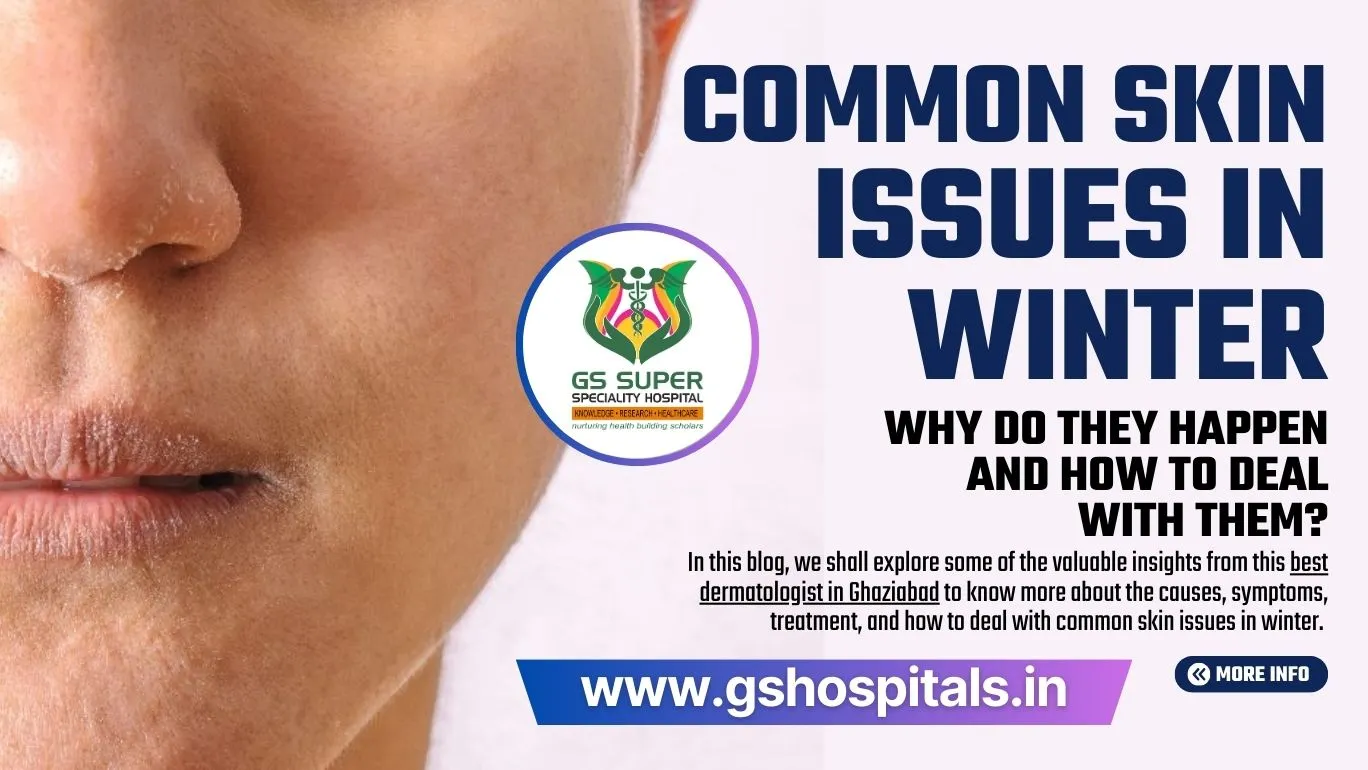Winters are here! With cozy mornings and lazy evenings come skin problems as well. If you are prone to common skin issues in winter, you are on the right page with us. The majority of us tend to feel dryness, tightness, and itchy or flaky skin issues in winter. Moreover, some skin problems tend to get triggered more in winter.
In this context, GS Hospital Hapur, the best skin specialist hospital in Delhi NCR, takes the initiative to bring about awareness about common skin issues in winter. GS Hospital is considered the top dermatologist in Delhi NCR dealing with chronic skin problems and has expertise in treating it successfully. In this blog, we shall explore some of the valuable insights from this best dermatologist in Ghaziabad to know more about the causes, symptoms, treatment, and how to deal with common skin issues in winter.

In winter, the skin tends to lose moisture due to exposure to cold and dry air. This results in itching, dryness, and inflamed and flaky patches of the skin. The skin cells may get damaged due to lack of hydration and may die out. However, it has been confirmed through research that skin has the tendency to regenerate. Taking preventive measures can work in preventing common skin care issues in winter.
Knowing the common causes of skin issues in winter can help eliminate the problem from the root causes. There are many causes of skin issues in winter which are as follows:
Here are some of the important symptoms of skin issues in winter that will help recognize the skin problem.
These symptoms may be localized or extensive depending on the affection and extent of the body parts. They may affect the hands, legs, face, neck, back, or any part of the body.
Here are the top 6 issues that tend to occur in winter:
1. Psoriasis: Psoriasis is considered an autoimmune skin disorder that causes redness, burning, extensive itching, and flaking. Winter is the main triggering factor which may cause flare-ups of the psoriasis. It is important to moisturize the skin daily post-bath with coconut oil to lock in moisture and prevent dryness. Lack of moisturization may cause further itching aggravating the psoriasis.
2. Eczema: Eczema is a condition characterized by inflammatory changes in the skin leading to boils, blisters, oozing of watery discharge, bleeding, itching, and dryness. Uncontrolled eczematous skin conditions during winters may cause flare-ups leading to skin infection. The best way to treat the eczematous skin condition is to moisturize the skin with natural moisturizers every 3-4 hours and keep the skin hydrated.
3. Atopic Dermatitis: Atopic dermatitis, as the name suggests is an inflammatory condition of the skin characterized by itching, burning, and redness. It causes dry itchy patches due to exposure to cold weather, harsh chemicals, or some other irritants. Staying away from such triggering factors may help to relieve atopic dermatitis.
4. Seborrhoeic dermatitis: Seborrhoeic dermatitis is also called dandruff. It may be yellow, sticky moist dandruff or white flaky dandruff on the scalp causing dryness and excessive itching. This is generally very common in winter. Using a mild anti-dandruff shampoo and oiling your scalp with natural coconut or almond oil helps to prevent chronic issues of dandruff.
5. Allergy: Cold urticaria or allergy is also known as hives mainly caused during the winter season. It is also known as winter rash with itching, red patches, and burning with a heat sensation. This rash lasts for 1-2 hours after exposure to cold air or cold water. It is important to moisturize your skin effectively and allow it to get absorbed into the skin to protect the skin barrier and avoid allergic responses of the skin.
6. Chapped Lips: Chapped lips are a common problem during the winter season. This may result in dry, stretchy, and peeling skin around the lips and mouth. In extreme cases, it may cause cuts and cracks resulting in lip bleeding. Using a lip balm is a must to prevent chapped lips.
Now, the question arises how to deal with common skin care issues. Let's explore it in the next part of the article.
Here are the best prevention tips for common skin issues in winter:
Cold air and dry weather can dehydrate your skin. Apart from environmental factors, lifestyle followed during winter also has a major impact on the skin. Winter tends to make skin dry, peeling, and flaky. Lack of hydration and moisturization can cause major skin issues during winter such as dermatitis.
It is important to check out for important vitamins and minerals in your daily diet to protect skin immunity. Skin immunity may be affected due to damaged skin barrier in case of lack of some essential vitamins. Vitamins A, B, C, D, and E are considered the important vitamins for skin immunity. Internal and external consumption of these vitamins is a must for better skin immunity.
Plant-based foods and drinks such as vegetables, fruits, nuts, and seeds are rich in skin nutrients consisting of fiber and collagen which help improve skin elasticity reducing the appearance of wrinkles. Consuming a wholesome diet is a must for holistic skin wellness.